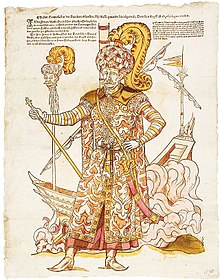Ali Pasha (Admiral)
Ali Pascha (also Müezzinzade Ali Pascha; † October 7, 1571 at Lepanto ) was an Ottoman admiral, commander of the Ottoman fleet in the naval battle of Lepanto in 1571.
Career
Ali Pasha was the son of a muezzin (hence his nickname) in Istanbul and a favorite of both Sultan Selim II and his harem ladies , who could hear Ali's melodious voice from the minaret of the mosque when he called to prayer instead of his father had sung.
Ali had a successful military and administrative career on land and sea. In May 1560 he took part in the naval battle of Djerba . From 1563 to 1566 he was Wali (Governor) of Egypt, and in 1565 he commanded the Egyptian contingent during the siege of Malta . In the summer of 1570, Ali Pasha commanded the fleet that transported the Ottoman invasion troops from Lala Kara Mustafa Pasha to the conquest of Cyprus and then thwarted Venetian attempts to bring reinforcements to Cyprus through their presence in the southern Aegean . In 1571 he was appointed commander-in-chief (" Kapudan Pascha " and "Kaptan-ı Derya") of the Ottoman fleet after his predecessor Piyale Pasha had lost the sultan's favor. Like Piyale Pascha, Ali Pascha also had a daughter of Selim's wife.
Lepanto
Ali Pascha commanded the Ottoman fleet, which was decisively defeated in the naval battle of Lepanto in 1571 by a united fleet of Christian states under Don Juan de Austria . In order to strengthen the morale of his troops, Selim had given his admiral one of the most valuable symbols of the empire, the great "banner of the caliphs", a green banner embroidered with Koran texts and the name of Allah 28,000 times in gold letters.
Still very young, like his opponent Don Juan, and actually not a sea soldier but a country soldier, Ali Pasha was less an accomplished tactician than a daring fighter. When the battle began, he immediately sought a direct duel with his opponent. His flagship , the Sultana , fought deck-to-deck with Don Juan's Real . Ali was badly wounded by musket fire, fell down and was beheaded by an overzealous Spanish soldier despite orders to take him alive . His head was displayed on a spit. This, and the capture of the caliphs' banner, significantly reduced the morale in the Turkish fleet and probably contributed to the defeat of the Ottoman fleet.
Ali Pasha's two young sons were captured during the battle. The older of them soon died in captivity, while the second was sent back to Istanbul by don Juan at the request of his mother.
successor
Ali Pasha's successor as commander in chief of the Ottoman naval forces ("Kaptan-ı Derya") was Kilic Ali Pascha (= Uludsch Ali Pascha ) in 1572 , who had distinguished himself at Lepanto and had escaped to Istanbul with part of the fleet.
literature
- Edward Hamilton Currey: Sea-Wolves of the Mediterranean . John Murrey, London 1910.
- Angus Konstam: Lepanto 1571: The Greatest Naval Battle of the Renaissance. Osprey, Oxford, 2003, ISBN 1-84176-409-4 .
- Hugh Bicheno: Crescent and Cross: The Battle of Lepanto 1571 . Phoenix, London 2004, ISBN 1-84212-753-5 .
- TCF Hopkins: Confrontation at Lepanto . Tom Doherty, New York 2006, ISBN 0-7653-0538-0 .
| personal data | |
|---|---|
| SURNAME | Ali Pasha |
| ALTERNATIVE NAMES | Müezzinzade Ali Pasha |
| BRIEF DESCRIPTION | Commander in chief of the Ottoman fleet in the naval battle of Lepanto |
| DATE OF BIRTH | 16th Century |
| DATE OF DEATH | October 7, 1571 |
| Place of death | at Lepanto |
